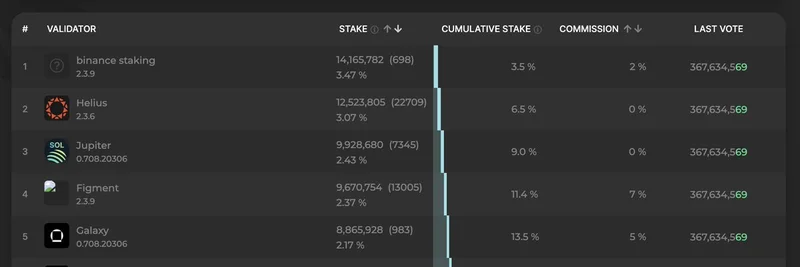Hey, Solana enthusiasts—have you checked the latest validator rankings? Jupiter Exchange just rocketed to the third spot, right behind heavyweights like Binance Staking and Helius. That's no small feat in a network as competitive as Solana, where validators are the backbone keeping everything running smoothly by validating transactions and securing the chain through proof-of-stake consensus.
But as Italo from JupiterExchange points out in his recent tweet, it's not just about size—it's about the value you bring to delegators. Let's break it down.
Zero Commissions: A Staker's Dream
Jupiter's validator setup is all about maximizing rewards for you, the staker. They're charging 0% commission on both inflation rewards (those steady SOL emissions from the network) and MEV (Max Extractable Value, basically the extra fees from optimizing transaction orders). In a world where validators often skim 5-10% off the top, this is a breath of fresh air.
Why does this matter? When you delegate your SOL to a validator, you're essentially voting with your stake to help secure the network. In return, you earn a share of the block rewards. Lower commissions mean more SOL stays in your pocket—or in this case, flowing straight back to holders of JupSOL, Jupiter's liquid staking token.
Priority Fees Fueling JupSOL
Here's the kicker: 100% of the priority fees from liquid staking token (LST) delegations go directly to JupSOL holders. Priority fees are those optional tips users pay to get their transactions processed faster during network congestion—think of it as express lane tolls on the Solana highway. By routing all of that back to JupSOL, Jupiter is supercharging yields for anyone staking through their LST.
If you're new to LSTs, they're a game-changer in DeFi. Instead of locking up your SOL in a cold wallet, you get a tokenized version (like JupSOL) that you can trade, lend, or use in other protocols while still earning staking rewards. It's liquidity without the lockup, perfect for the fast-paced world of Solana memes and swaps.
Performance That Packs a Punch
Scale means nothing if you're dropping blocks or lagging behind. Jupiter's validator isn't just big—it's consistently in the top tier of the top 20, often leading the pack in uptime and vote success rates. That "last vote" timestamp you see in the rankings? It's a snapshot of reliability, and Jupiter's holding strong at 367,634,569—right up there with the best.
For context, Solana's validator set is massive (over 1,500 active ones), so cracking the top three puts Jupiter in elite company. This boost in stake (over 9.9 million SOL delegated, per the screenshot) signals growing trust from the community, especially as Solana continues to dominate in high-throughput DeFi and meme coin trading.
What This Means for the Solana Ecosystem
Jupiter's rise underscores a shift toward user-centric validation on Solana. With tools like Jito enabling MEV capture and LSTs like JupSOL bridging staking with DeFi, we're seeing more incentives aligned for everyday users. If you're into meme tokens or just HODLing SOL, this could mean better APYs and smoother experiences across the board.
Pro tip: If you're delegating, tools like Solana Beach or StakeView let you track these rankings in real-time. And for JupSOL specifics, head over to Jupiter's docs.
Big congrats to the Jupiter team—this move not only cements their spot in Solana's infrastructure but also sets a bar for what transparent, high-performance validation looks like. What's your take? Are you staking with Jupiter yet? Drop your thoughts below.
Stay tuned to Meme Insider for more on how DeFi giants like Jupiter are shaking up the meme token meta and beyond.


